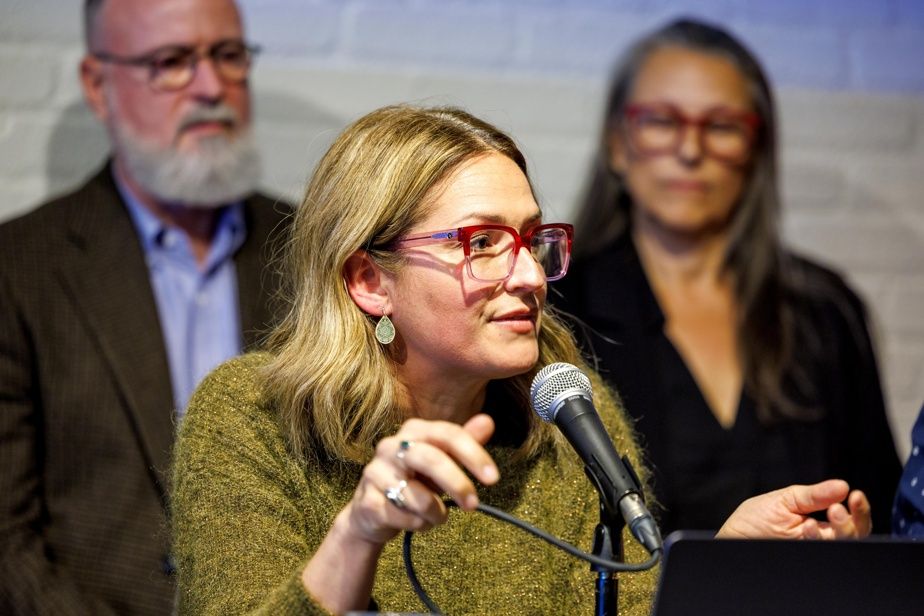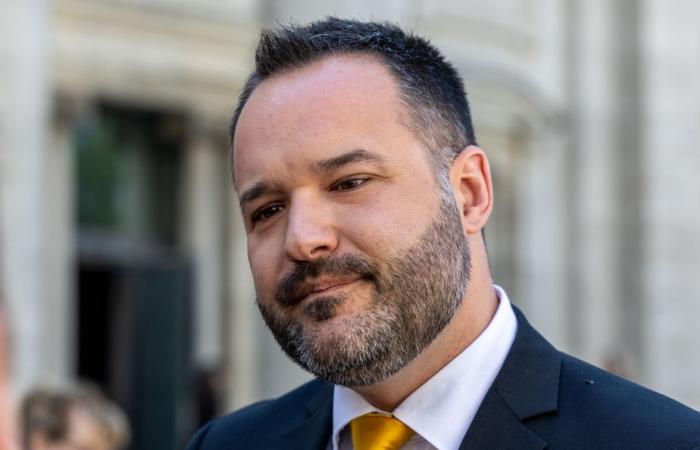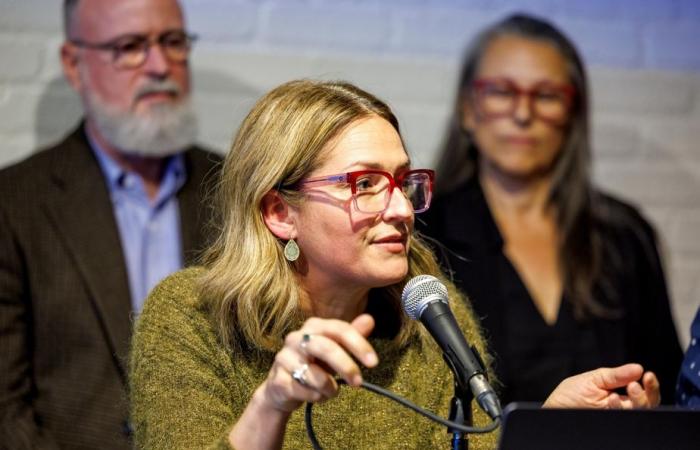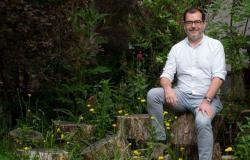In a rare public outing, 17 Quebec cultural organizations called on François Legault’s government on Wednesday to increase the permanent appropriations of the Conseil des arts et des lettres du Québec (CALQ) to 200 million per year. A request that the Minister of Culture and Communications, Mathieu Lacombe, rejected, instead opening the way to a discussion on a reallocation of existing envelopes.
Published yesterday at 4:21 p.m.
Led by Camille Cazin, from the Regroupement des artistes en artsvisuals (RAAV), Caroline Gignac, from the Conseil québécois du théâtre (CQT), Julie-Anne Richard, from the Professional Association of Show Presenters (RIDEAU), and Pierre-Yves Villeneuve, of the Union of Quebec Writers, the Common Front for Quebec Arts launched a real cry from the heart to preserve the cultural sector.
It was Caroline Gignac, of the CQT, who formulated the demands of the Common Front, before unveiling the campaign slogan: “Our culture deserves better than to be cut down”.
We are asking to increase the CALQ’s permanent appropriations to 200 million. Acting in this way will allow the Council to offer better predictability to the sector, to be able to adequately respond to the requests addressed to them and to correct the amounts granted last July so that they better correspond to the reality of needs.
Caroline Gignac
Mme Gignac also requests that these additional credits be recurring and indexed annually to the cost of living.
“Our members are tired of managing temporary measures piecemeal, due to lack of money. What we are asking for today is not luxury, it is to avoid a step backwards, she insisted. If we do nothing, institutions will close, the next generation will be less supported, the public in the regions will have less access to cultural events, art forms will die out, our international influence will diminish, our expertise will be lost and jobs will be lost. from various economic sectors will be abolished. »
“Difficult budgetary context”
“These requests do not surprise me, because it is a discussion that has been in the air for a while,” reacted the Minister of Culture and Communications, Mathieu Lacombe.
“I understand the community’s desire to see investments increase in culture and I think it is legitimate,” he said. What I find important to say is that funding is not declining, it is increasing. Could he progress faster? That’s what I’m being asked. »
PHOTO JOSIE DESMARAIS, LA PRESSE ARCHIVES
Mathieu Lacombe, Minister of Culture and Communications
The budgetary context is difficult, so it would be risky for me to commit to increasing the culture budget to 200 million. On the other hand, I will always be an ally so that the amounts continue to increase as has been the case since 2018. Sometimes, the solution is not to inject more money, but to distribute it differently.
Mathieu Lacombe, Minister of Culture and Communications
The precariousness in the cultural environment is nevertheless palpable. Just this week, the founder and artistic director of the Phénomena festival, D. Kimm, indicated that the current presentation could well be the last given that “the subsidies have not increased”. Several festivals and cultural organizations are also at an impasse.
According to the Common Front for the Arts, the Quebec government has been reducing the CALQ’s budget for several years. In the last three budgetary years, they say, the total CALQ budget went from 185 million in 2022-2023 to 172 million in 2023-2024. It was 160 million for 2024-2025. A sum which was however increased by 10 million subsequently.
But Minister Mathieu Lacombe disputes these figures. “Comparing the CALQ’s expenses last year with the credits granted to it this year by concluding that there will be a drop is methodologically erroneous. What I can tell you is that since 2018, if we take all the envelopes, the CALQ budget has increased by 35%. »
“What Minister Lacombe fails to say,” retorts the general director of RIDEAU, Julie-Anne Richard, “is that this 35% increase takes into account all non-recurring COVID aid granted to the cultural sector, including the very The vast majority have already ended or will end within the year. »

PHOTO ALAIN ROBERGE, THE PRESS
The general director of RIDEAU, Julie-Anne Richard
Mme Richard notably mentioned the requests for mission support made last February to the CALQ for the next four years.
“The CALQ received $151 million in mission support requests and was only able to offer $94 million in recurring support. The gap between the demands of the community and the financial capacities of the CALQ had never been so great in the past, she observed. The gap between the needs of the cultural community and government support is therefore widening. »
Mathieu Lacombe agrees that there is a discussion to be had to find solutions. “I am open to discussing how we spend money on culture. We perhaps need to review the way we support organizations using the funds we have. I feel that most organizations would like us to increase funding for the mission, much more than what we are doing at the moment. In return, we should have fewer specific programs for additions to the mission or more complementary projects. »
No to states general
The public exit of the Common Front for the Arts is not linked to the request made Wednesday in an open letter signed by 300 creators and published in The Press for the government of Quebec to organize general meetings on culture, in particular to “understand the workings of grant allocation and budget management”1.
“Our priority is to consolidate the CALQ budget,” replied the instigators of the Common Front. Afterwards, should other solutions be considered within the framework of general statements? We have not had discussions with the artists who wrote this letter. »
Is the Minister of Culture and Communications in favor of a Estates General? “I agree with the signatories of the letter who ask for greater transparency on how funds are invested in culture in Quebec. I am open to doing this exercise. Are Estates General the best way to get there? I don’t think so. I think we are capable of meeting the challenges that arise with the sectors concerned in a personalized way rather than by holding a national event where everyone’s interests intertwine. »
Mathieu Lacombe discusses the project of financing festivals, the working group which is looking into the financing of audiovisual productions, the bill on the discoverability of online content, the work of the Consumer Protection Office which seeks solutions for the resale of tickets for shows and sporting events. “I think we are capable of taking on each of these challenges and working with each of these sectors. I don’t see what the Estates General would bring. »
Parti Québécois MP Pascal Bérubé presented a motion to support the creation of general statements on culture, but also to accommodate the request from the 17 cultural organizations for increased funding for the CALQ. The motion was blocked by the Coalition Avenir Québec government.
1. Read the open letter “It’s time for artists to get answers”








